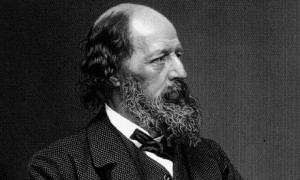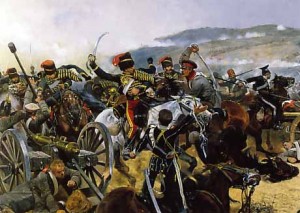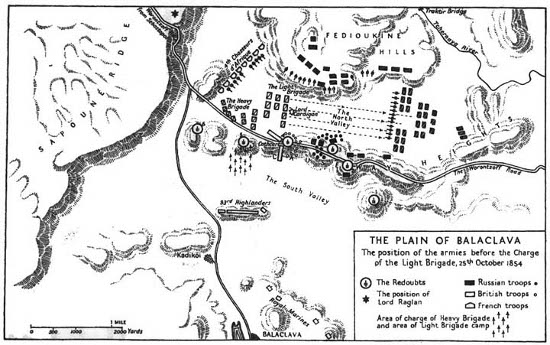Today – December 9th in the year 1854 a poem was published in the Times which has become the most famous penned by Alfred Tennyson. It remains one of the most evocative verses relating to a battle. What made it particularly effective is that it related not to a great victory but to a disaster. Indeed it is fascinating that for a nation with s0 many moments of military success which adorn the battle honours of regiments up and down the land (Waterloo, El Alamein, Agincourt, Crecy etc) it is often the disasters or magnificent defeats which we recall the most.
This is true with Dunkirk, Isandlwana and Arnhem but no more so than with the Charge of the Light Brigade. This incident involved a charge by five regiments of British cavalry consisting of the 4th and 13th Light Dragoons, 17th Lancers, and the 8th and 11th Hussars, led by Lord Cardigan against Russian forces during the Battle of Balaclava on 25 October 1854 in the Crimean War.
The overall army commander was the elderly Lord Raglan who viewed the battle from a high vantage point and was somewhat removed from the location of the Light Brigade. Cardigan’s superior was the Earl of Lucan. The problem here was that Cardigan was Lucan’s brother-in-law and the pair hated each other.In such an enviroment an error of communication could easily lead to a disaster.
High up on his hill Raglan was pleased with an attack which had swept the Russians away from the Causeway Heights and the Southern Valley. He was however concerned that the Russians were getting away with their guns and sent an order to Lucan to attack with cavalry to stop this. Lucan hurriedly sent a Captain Nolan with oral orders to Cardigan. Cardigan could not SEE the southern valley at all from his position and when he asked for clarification Nolan is reputed to have waved vaguely up what Cardigan assumed was the north valley and shouted “their are your guns, sir!”.
Cardigan set off with 673 cavalry and did as instructed. He charged along the north valley. This valley was lined with no less than twenty Russian Battalions and fifty artillery pieces. The British did reach their guns but the regiments were slaughtered. Of the six hundred and seventy three men who charged down “The Valley of Death” only a hundred and ninety five survived unwounded.
Nolan apparently tried to divert the charge by galloping across the front of Cardigan but he was killed early in the charge. Afterwards everyone blamed everyone else. Cardigan’s case was not helped by the fact he left the battlefield that night and enjoyed champagne on his own yacht. Rumours went about that he was not present in the charge – but he was. He might have been arrogant and a poor officer but he was courageous enough and was always at the lead of the charge.
News of the calamity reached London three weeks later. The result was a huge public outcry. Tennyson was so upset by the disaster that he wrote his poem only a few minutes after reading an account in The Times. It was published soon afterwards and became immediately popular. In the Crimea it was distributed in pamphlet form.

We even know how the poet intended the poem to sound thanks to a recording made in 1890 on soft wax cylinders. Tennyson himself can be heard reading his words. It pretty crackly and of course the video is simulated but you can listen on You-tube :
 Half a league onward, Half a league onward,All in the valley of Death  Rode the six hundred. Rode the six hundred.“Forward, the Light Brigade! “Charge for the guns!” he said: Into the valley of Death  Rode the six hundred. Rode the six hundred.
Was there a man dismay’d? Not tho’ the soldier knew  Someone had blunder’d: Someone had blunder’d:Theirs not to make reply, Theirs not to reason why, Theirs but to do and die: Into the valley of Death  Rode the six hundred. Rode the six hundred.
Cannon to left of them, Cannon in front of them  Volley’d and thunder’d; Volley’d and thunder’d;Storm’d at with shot and shell, Boldly they rode and well, Into the jaws of Death, Into the mouth of Hell  Rode the six hundred. Rode the six hundred.
Flash’d as they turn’d in air, Sabring the gunners there, Charging an army, while  All the world wonder’d: All the world wonder’d:Plunged in the battery-smoke Right thro’ the line they broke; Cossack and Russian Reel’d from the sabre stroke  Shatter’d and sunder’d. Shatter’d and sunder’d.Then they rode back, but not  Not the six hundred. Not the six hundred.
Cannon to left of them, Cannon behind them  Volley’d and thunder’d; Volley’d and thunder’d;Storm’d at with shot and shell, While horse and hero fell, They that had fought so well Came thro’ the jaws of Death Back from the mouth of Hell, All that was left of them,  Left of six hundred. Left of six hundred.
O the wild charge they made!  All the world wondered. All the world wondered.Honor the charge they made, Honor the Light Brigade,  Noble six hundred. Noble six hundred. |
Copied from Poems of Alfred Tennyson,
J. E. Tilton and Company, Boston, 1870




Related Articles
1 user responded in this post
[…] the original post here: Richard's Ramblings » Post Topic » The Charge of the Light Brigade Share on beboBlog this!Bookmark on DeliciousDigg this postShare on dzoneRecommend on FacebookShare […]